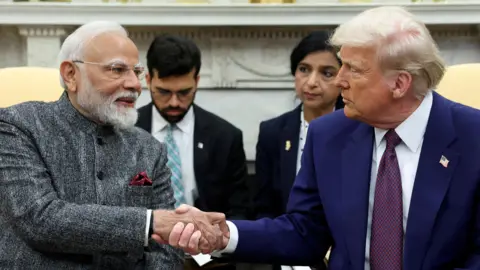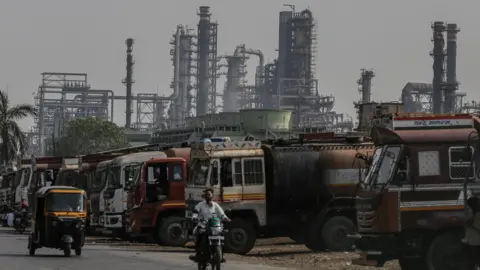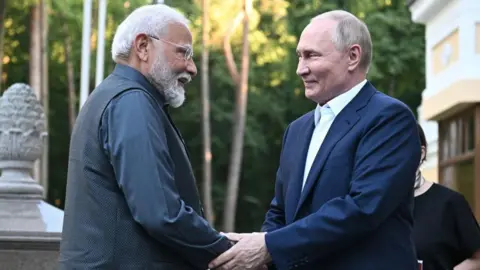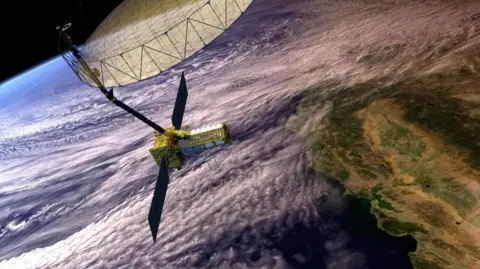BBC News, Delhi
 Roots
RootsUS Prime Minister Narendra Modi was one of the first world leaders to travel for Washington Week after US President Donald Trump started his second term.
He called Modi his “great friend” because both countries set a set The ambitious goal of doubling their business $ 500BN by 2030.
But after less than six months, the relationship is hitting the rock bottom.
Trump has now imposed a total of 50% tariffs Goods imported from IndiaAnd his earlier threats to carry an additional 10% for the country’s membership in BRICS grouping, including China, Russia and South Africa, still stands.
He initially imposed 25% tariff, but on Wednesday announced an additional 25% as a fine for the purchase of Delhi’s Russian oil – the Indian government called “unfair, inappropriate and unfair”.
And last week, Trump called India’s economy “dead”.
This is a surprising opposite in a relationship that has gone with strength with strength in the last two decades, thanks to gradual governments in both countries, bipartite support and convergence efforts on global issues.
In the last few weeks, there were positive signs from Washington and Delhi about a adjacent trade deal. Now it looks difficult, if not impossible.
so what’s wrong?
A series of misunderstandings, grandeur, geo -political and domestic political pressure have broken the talks.
Delhi has been stopped in its response to Trump’s tireds so far, hoping that diplomacy may eventually help secure a business deal. But in Trump’s White House, there is no guarantee.
Trump has commented on several issues that consider Delhi red lines. The largest of them is trump repeatedly India and its rival Pakistan on a similar rung,
 Bloomberg through Getty Image
Bloomberg through Getty ImageUS President hosted Pakistani Army Chief Asim Munir A few weeks after a bitter conflict between the two South Asian rivals at the White House.
He then signed a trade deal with Pakistan, offering a 19%preference tariff rate to the country with a deal to find out the country’s oil reserves. He went on saying that someday, Pakistan can sell oil to India.
Another continuous irritable Trump for Delhi repeatedly claims that the US broke a ceasefire between India and Pakistan.
India sees its controversy with Pakistan on Kashmir as its internal relationship and has always rejected the mediation of third party on the issue. Most world leaders have been sensitive to the situation in Delhi, including Trump in his first term as President.
But now it is not so. Modi told the Parliament of India that the US President has doubled his claim even after “no country mediation in ceasefire”.
Modi did not name Trump or America, but domestic political pressure is growing on her, which is not “bending” in the White House.
“The fact that it is happening against the backdrop of a heavy and high-level American engagement with Islamabad soon after the India-Pakistan struggle, Delhi and the wider Indian public are even more falling. All these sharpus concerns have been harassed by some people in India that America cannot be really trusted as a partner,” called South Asia-based South Asia’s analyst.
He says that some anger in Delhi may “be the goods of cold war-era”, but “this time it has intensified along with real-time development”.
Modi’s government thrives on nationalist issues, so its supporters will probably expect a strong response to the US.
This is a catch -22 situation – Delhi still wants to make a deal, but does not want to come as a bakaling under the pressure of Trump.
And it seems that Delhi is slowly releasing restraint. In response to Washington’s anger over India’s procurement of Russian oil, Delhi vowed to take “all necessary measures” to protect its “national interests and economic security”.
But the question is that Trump, who loved India’s hospitality and earlier called it a great country, was a sharp against a reliable ally.
Some analysts saw their insults as a pressure strategy to secure a deal that they think works for the US.
“Trump is a real estate magnet and a difficult dialogue. His style may not be diplomatic, but he looks for results.
A source in the Government of India said that Delhi gave several concessions to Washington, including no tariffs on industrial goods, and a phased decrease of tariffs on cars and liquor. It also signed a deal to go to Elon Musk’s Starlink Start Operations in India.
But Washington wanted to reach India’s agriculture and dairy areas to reduce the $ 45BN trade deficit that runs with Delhi.
 Getty images
Getty imagesBut these areas are a red line for Modi or, for that case, any Indian Prime Minister. India has more than 45% employment in agriculture and related fields and Civil governments have protected farmers fiercely,
Mr. Kugelman believes that there is no option for India by giving Washington’s demands.
He says, “India first needs to accept public anger and make it clear that it will not come under pressure. It is important for domestic political reasons.”
He also believes that Trump urges that India stops importing oil from Moscow. Growing disappointment Russian President Vladimir Putin.
“We are watching Trump to continue their pressure strategy, trying to cut Russia with their most important oil buyers by punishing them to trade with Moscow,” he says.
But Delhi cannot take the risk of preventing oil from importing oil from Russia overnight.
According to the International Energy Agency (IEA), India is already the third largest consumer in crude and can lead China to the top by 2030 as its energy demand is likely to grow with a rapidly growing middle class.
Russia now exceeds 30% of India’s total oil imports, in 2021–22 at least one significant jump.
Many people in the West see it indirectly as a war of Moscow as India, but Delhi denied that buying that buying Russian oil at a discount ensures energy security for its millions of citizens.
India also sees Russia as its “all-vender” ally. Moscow traditionally has come to the rescue of Delhi during the previous crises and still receives support among the broad Indian public.
According to the Stockholm International Peace Research Institute, Moscow is also Delhi’s largest weapon supplier, although its share in India’s defense import portfolio fell to 36% between 2016 and 2020 to 36%.
This was largely due to Delhi to promote domestic manufacturing and buy more than the US, France and Israel.
But Russia’s role in India’s defense strategy cannot be eliminated. This is something that the West understood and not challenged – until Trump decided to break away from the established criteria.
 NASA
NASAUntil now, India was able to successfully walk the diplomatic criterion with the West with its strong ties for Russia.
The United States has long seen India as a bull against China’s dominance in the Indo-Pacific sector, which ensured bipartisan support for Delhi in Washington.
And Moscow (although sometimes reluctantly) did not react harshly to his colleague to close ties with Washington and other Western countries.
But now Trump has challenged the post. How Delhi reacts will decide the future of Indo-US relationship.
India has been measured in its response so far, but is not completely back. In its statement, it said that the US encouraged it to buy oil from Russia for global energy market stability.
It was also said that it was inappropriate to target because the European Union continues to buy energy, fertilizer, mining and chemical products from Russia.
While things seem bad, some analysts say that everything is not lost. There are close relations in many areas of India and the US, which cannot be uprooted overnight.
The two countries closely cooperate closely in space technology, IT, education and defense sectors.
Many large domestic IT firms have invested heavily in the US, and most of the large silicone Valley firms operate in India.
“I think the basic principles of the relationship are not weak. It is a contradiction that the day Trump declared 25% tariffs and unspecified punishment, India and the US collaborated in a strategic field when a Indian rocket sent a jointly developed satellite into space“Says Mr. Mishra.
It will be interesting to see how India reacts to Trump’s sharp rhetoric.
“Trump is uncontrolled in his approach to foreign policy for foreign policy,” says Mr. Kugelman.
But he says that given that work in the last two decades, there is a lot of faith in partnership.
“So what is lost can be rebuilt potentially. But due to the range of current unhealthy, it may take a long time.”
Follow BBC News India Instagram, YouTube, Twitter And Facebook,
